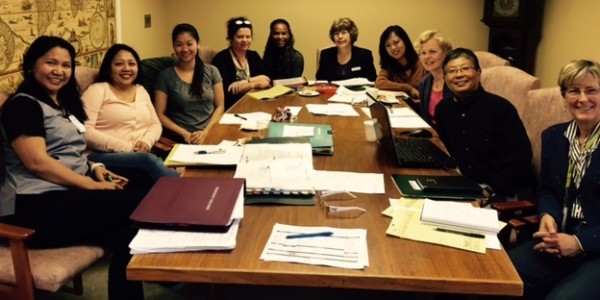New palliative program enhances end-of-life care
When the time comes for a family to discuss end-of-life care of a loved one, the conversation can be difficult, emotional and fraught with differing opinions. For residential care providers, these discussions are challenging but necessary steps to take to provide well-managed care that everyone can feel comfortable with.
“These are never easy discussions to have,” says Lourdes Del Rosario, registered nurse and director of care at Royal Ascot Care Centre in Vancouver. “But in order for the resident to remain comfortable in their end-of-life care, we all need to be on the same page so that no one is left shaken or surprised.”
Residents receive personal end-of-life care planning
When residents arrive at the Royal Ascot Centre, a VCH-contracted residential care facility that provides end-of-life care, physicians, nurses and residential staff meet with each individual and their family to discuss a care plan that is tailored to meet their personal needs. They address degrees of intervention, medication planning, spiritual and cultural preferences, and other elements that help define that resident’s quality of life.
“We want the resident and their family to feel comfortable with the level of care we are giving them,” says Del Rosario. “We are all trained to recognize the stages of dementia and frailty in each resident and provide the right course of action. You can see the residents are calmer, more comfortable in a home-like setting.”
Palliative Care in Residential Care program
Frailty and dementia are life-limiting illnesses that can be more unpredictable than others, especially in a person’s last 6-12 months of life. For that reason prognosis and goals of care are less likely to be discussed among residents and their family members. This can result in burdensome treatments and hospitalizations that will not always improve health outcomes and can even be harmful to the resident. In response, the Palliative Care in Residential Care module was created to improve the quality of living and dying in residential care facilities.
A collaboration between VCH, the Practice Support Program, the Vancouver Division of Family Practice and the Community Geriatrics research unit at the UBC Department of Family Practice, the learning module was taught to the Royal Ascot Care Centre along with 13 other VCH-contracted residential care facilities last fall. Together they learned how to identify residents who would benefit from a palliative approach to care, focusing on those with advanced frailty and dementia. They also improved their skills for communicating prognosis to family members and discussing goals of care.
“We wanted to create a culture shift by empowering teams to discuss goals of care and respecting both the resident’s dignity and personhood,” says Dr Tim Sakaluk, medical director of VCH-Vancouver’s Home Hospice Palliative Care Service.
More empowered staff
Six months after the program, Del Rosario says staff at Royal Ascot feel more empowered and responsible in a resident’s care plan. “Now we are having more team meetings and team rounds to evaluate residents’ trajectory of health. I will ask ‘Would you be surprised if they passed away in the next six months?’ and we assess situations and brainstorm potential solutions.”
Participants in the module reported feeling greater confidence in caring for residents with advanced frailty and dementia and feeling more comfortable speaking with residents and family members about prognosis. Their confidence is reflected among the residents and their families, as participating facilities now report an increase in end-of-life care performed at the residences than at hospital.
Next program in November
The program is considered so successful that the Ministry of Health recently donated $250,000 to expand education among the remaining 22 residential care facilities in Vancouver. The next module is scheduled to begin November 10. “This program has really helped create a collaborative effort between physicians and residential care staff,” says Dr Sakaluk. “It creates a common language and outlook and more conversation surrounding end-of-life. It becomes less of a scary topic to discuss.”
Related links:
Unique ambulatory clinic opens

